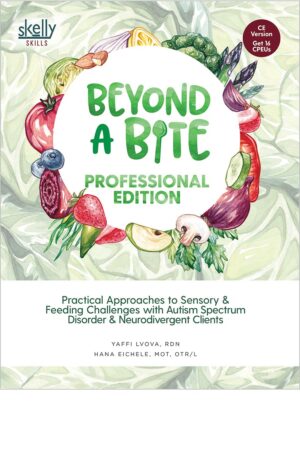

$20.00
On-demand Webinar! Enhance your understanding of pediatric sensory and regulatory challenges, and how to help caregivers navigate mealtimes for success! Incorporate counseling dialogue to empower caregivers to create happier and healthier mealtimes.
Bonus! All attendees will receive a free Creating a Mealtime Routine handout from Beyond a Bite Professional Edition!
This webinar is CDR-approved for 1 CPEU for RD/RDNs and DTR/NDTRs, and CBDCE-approved for 1 CEU for CDCES’s.
Learn How Webinar CEs Work
CPEU/CEU: 1
Course Expiration Date--PLEASE NOTE EXPIRING SOON: 5/31/2024. You have until that date to complete your CPEU Evaluation or Webinar Feedback Survey for this course.
Course Type: 175 – Recorded Pre-Approved CPE
Includes Feedback Survey: Your CPEU/CEU certificate will be made available for you to download after completing the feedback survey. Link to survey is provided on Webinar page.
Suggested Learning Level: 1
On-demand Webinar! Boost your knowledge base and confidence in identifying and understanding risk factors for feeding issues related to developmental delays and sensory processing disorders. Learn how to guide caregivers through mealtime challenges while promoting mindfulness and optimizing nutritional status. Led by the authors of the brand new Beyond a Bite Professional Edition: Practical Approaches to Sensory and Feeding Challenges With Autism Spectrum Disorder and Neurodivergent Clients Yaffi Lvova, RDN and Hana Eichele, MOT, OTR/L.
Learning Objectives:
See the LNCs & PIs tab for suggested learning codes.
CPEU/CEU: 1 NOTE: Course Expiration Date--PLEASE NOTE EXPIRING SOON: 5/31/2024. You have until that date to complete your CPEU Evaluation or Webinar Feedback Survey for this course.
1.3.3 Builds rapport and trust within the relationship while respecting boundaries.
1.3.6 Develops and implements culturally-appropriate strategies when delivering service.
1.3.8 Initiates collective efforts with others to implement resources to support culturally-diverse customers.
2.1.1 Assesses the communication needs of the individual, customer or population.
2.1.7 Delivers information and opinions in a respectful and professional manner.
8.1.1 Interprets and applies evidence-based comparative standards for determining nutritional needs.
8.1.2 Applies knowledge of food and nutrition as well as the biological, physical and social sciences in practice.
8.1.5 Applies medical nutrition therapy in disease prevention and management.
8.2.1 Assesses the physical, social and cultural needs of the individual, group, community or population.
8.2.2 Applies knowledge of health determinants when planning, developing and implementing services, programs, meal plans and menus.
8.2.3 Implements individualized services to reflect customer-centered approach as it pertains to the customer’s physical, social, cultural, institutional and economic environment.
8.3.1 Maintains the knowledge and skill to manage a variety of disease states and clinical conditions.
8.3.3 Takes action to address deficiencies to enhance practice.
8.3.4 Enhances knowledge to foster career advancement.
8.3.5 Keeps abreast of changes in practice and within practice environments that affect scope of practice.
8.3.6 Keeps abreast of current nutrition and dietetics knowledge and trends.
8.3.7 Integrates new knowledge and skills into practice.
9.1.3 Identifies and analyzes factors that influence behavioral change.
9.1.4 Evaluates factors that influence the learning process and skill building.
9.2.1 Assesses learning needs of the individual or target group.
9.2.4 Collaborates with learner(s) and colleagues to formulate specific, measurable and attainable objectives and goals.
9.4.2 Selects and uses appropriate content and teaching methods to meet individual and group needs.
9.4.4 Adjusts education plan to meet the needs of the individual, group and population.
9.4.5 Implements an individualized teaching plan in order to promote, maintain and enhance nutritional health and learning.
9.4.8 Evaluates the impact of the individual’s learning and new knowledge and skills.
9.6.10 Evaluates the effectiveness of counseling or therapy and makes modifications as required.
10.2.1 Identifies and selects valid and reliable tools to conduct a comprehensive nutrition assessment.
10.2.5 Develops nutrition prescription to communicate required food and nutrient needs.
10.2.7 Prioritizes specific nutrition problem(s).
10.2.8 Establishes the plan of care, directly addressing the nutrition diagnosis in collaboration with the patient in defining the time, frequency and duration of the intervention.
10.2.9 In collaboration with the client and interdisciplinary team (including NDTRs), selects and implements current and evidence-based nutrition interventions and patient education.
10.4.1 Collects information related to the patients use of pharmacotherapy and dietary supplements.
10.4.2 Applies knowledge of pharmacotherapy and its effect on nutrient absorption, utilization and metabolism when developing and/or revising the plan of care.
10.4.3 Evaluates, educates and counsels on the interrelationship and impact of pharmacotherapy on nutrient absorption.
10.4.4 Makes recommendations for the appropriate use of vitamin and mineral supplementation in the management of health and disease.
Only logged in customers who have purchased this product may leave a review.
Skelly Skills is a provider of continuing education for dietitians (RD/RDNs), certified diabetes care and education specialists (CDCESs), registered nurses (RNs) and diet technicians, registered (DTR/NDTR). We provide CPE, (often called CEU, CE, and CPEU) for all of these groups, and all of our courses are approved for CE by the Commission on Dietetic Registration (CDR) and the CBDCE for CDCESs. Skelly Skills receives no commercial support and does not accept advertising or sponsorship of any kind.

CPEU/CEU: 16

CPEU/CEU: 1

CPEU/CEU: 1



Purchase your webinar and receive a link to the webinar immediately.
Watch your webinar and then submit the CE Feedback Survey form by the course expiration date.
After submitting your CE Feedback Survey, you will be able to download your CPEU/CEU certificate as a pdf and keep for your records.

We use cookies to ensure you get the best experience. By using our website or clicking "accept", you consent to cookies.
E. M., RD, LD –
This was super informative. I work at WIC and get a lot of moms who have picky kids. These tips are important to be able to help neurodiverse and neurotypical kids to get them eating and have enjoyable experiences with food.
V.S., RD, LD, CLC –
I am a WIC dietitian and the number one concern with my parents is their child is a picky eater. This was extremely helpful to me!
M. L.-C., EdD, MPH, RDN, CDCES –
Awesome presentation.